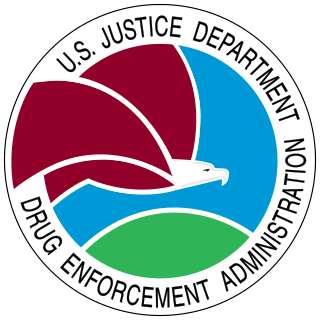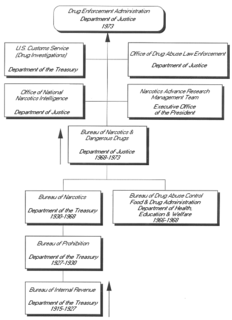This article does not cite any sources .(August 2008) (Learn how and when to remove this template message) |
Diversion Investigator (DI) is the title of a specialist position within the Drug Enforcement Administration (DEA) of the United States Department of Justice. Most DIs are part of DEA's Diversion Control Program and are assigned to various DEA field offices throughout the U.S. and in several foreign countries. DIs are responsible for addressing the problem of diversion of controlled pharmaceuticals and regulated chemicals from the legitimate channels in which they are manufactured, distributed, and dispensed. The mission of a DI is to aid the U.S. pharmaceutical and chemical industries in complying with the Federal Controlled Substances Act (CSA) and other pertinent laws, as well as international treaties and conventions. DIs conduct investigations to uncover and investigate suspected sources of diversion and take appropriate criminal, civil and/or administrative actions.

The Drug Enforcement Administration (DEA) is a United States federal law enforcement agency under the United States Department of Justice, tasked with combating drug smuggling and distribution within the United States. The DEA is the lead agency for domestic enforcement of the Controlled Substances Act, sharing concurrent jurisdiction with the Federal Bureau of Investigation (FBI), Immigration and Customs Enforcement (ICE), U.S. Customs and Border Protection (CBP), and the Department of Homeland Security (DHS). It has sole responsibility for coordinating and pursuing US drug investigations both domestic and abroad.

The United States Department of Justice (DOJ), also known as the Justice Department, is a federal executive department of the U.S. government, responsible for the enforcement of the law and administration of justice in the United States, equivalent to the justice or interior ministries of other countries. The department was formed in 1870 during the Ulysses S. Grant administration.
Drug diversion is a medical and legal concept involving the transfer of any legally prescribed controlled substance from the individual for whom it was prescribed to another person for any illicit use. The definition varies slightly among different jurisdictions, but the transfer of a controlled substance alone usually does not constitute a diversion, since certain controlled substances that are prescribed to a child are intended to be administered by an adult, as directed by a medical professional. The term comes from the "diverting" of the drugs from their original licit medical purpose. In some jurisdictions, drug diversion programs are available to first time offenders of diversion drug laws, which "divert" offenders from the criminal justice system to a program of education and rehabilitation.
The DI position was originally known as a "Compliance Investigator" and was created to address the regulatory responsibilities of the Bureau of Narcotics and Dangerous Drugs (BNDD) following the enactment of the CSA in 1970. Around 1983-84, the position had been given its current name. One key difference between the DI position and that of a DEA Special Agent is that DEA has never authorized DIs (or their Compliance Investigator predecessors) to carry firearms or to perform traditional law enforcement activities such as making arrests or controlling informants. DEA Special Agents, on the other hand, are fully commissioned Federal law enforcement officers. From 1971 to 1995, DIs were classified as series 1810 (general investigator) within the U.S. civil service system. In other Federal agencies, series 1810 investigators performed administrative investigative functions such as background investigations for security clearances (Office of Personnel Management and the Defense Security Service) or investigations of equal employment opportunity violations (Equal Employment Opportunity Commission). In 1995, DEA reclassified DIs to series 1801 (general inspection, investigation, enforcement, and compliance) to reflect the position's mixture of criminal, civil, and administrative investigative duties.

The Bureau of Narcotics and Dangerous Drugs (BNDD) was a bureau within the United States Department of Justice (DOJ) and a predecessor agency of the modern Drug Enforcement Administration (DEA).
A Special Agent, in the United States, is usually a criminal investigator or detective for a federal or state government, that primarily serves in investigatory positions. Additionally, many federal and state "Special Agents" operate in "criminal intelligence" based roles as well. Within the US federal law enforcement system, dozens of federal agencies employ federal law enforcement officers, each with different criteria pertaining to the use of the titles Special Agent and Agent.
A law enforcement agency (LEA), in North American English, is a government agency responsible for the enforcement of the laws.
In order to accomplish their mission, DIs employ a wide range of investigative activities. One such activity is the scheduled regulatory investigation (or audit) of registered handlers of controlled substances. These investigations serve to deter diversion through evaluation of the registrants' record-keeping procedures, security safeguards and general compliance with the CSA and implementing regulations. Legitimate handlers of controlled substances subject to regulatory investigation include drug manufacturers, distributors (wholesalers), importers and exporters, and narcotic treatment programs, which are those programs primarily designed to furnish methadone to narcotic addicts as part of a program of addiction treatment.
A controlled substance is generally a drug or chemical whose manufacture, possession, or use is regulated by a government, such as illicitly used drugs or prescription medications that are designated by law. Some treaties, notably the Single Convention on Narcotic Drugs, the Convention on Psychotropic Substances, and the United Nations Convention Against Illicit Traffic in Narcotic Drugs and Psychotropic Substances provide internationally agreed upon "schedules" of controlled substances, which have been incorporated into national laws, however national laws usually significantly expand on these international convention.

Security is freedom from, or resilience against, potential harm caused by others. Beneficiaries of security may be of persons and social groups, objects and institutions, ecosystems or any other entity or phenomenon vulnerable to unwanted change by its environment.

The term narcotic originally referred medically to any psychoactive compound with sleep-inducing properties. In the United States, it has since become associated with opiates and opioids, commonly morphine and heroin, as well as derivatives of many of the compounds found within raw opium latex. The primary three are morphine, codeine, and thebaine.
Most recently, there has been a growing push to investigate diversion of controlled substances involving sale and distribution via the Internet. The rapidly changing environment and an increase in Internet diversion of controlled substances has created a need for programs to target these sources of diversion.

The Internet is the global system of interconnected computer networks that use the Internet protocol suite (TCP/IP) to link devices worldwide. It is a network of networks that consists of private, public, academic, business, and government networks of local to global scope, linked by a broad array of electronic, wireless, and optical networking technologies. The Internet carries a vast range of information resources and services, such as the inter-linked hypertext documents and applications of the World Wide Web (WWW), electronic mail, telephony, and file sharing.
Frequently, DIs are involved in investigations aimed at the most serious practitioner-level registrant violators (e.g., medical practitioners, pharmacies, etc.) of controlled substances laws and regulations. These registrants have a documented or suspected history of diversion of drugs/chemicals into the illicit market. DIs collect and analyze information developed during their investigations and consult with supervisory personnel to determine if criminal prosecution is warranted. DIs work closely with DEA Special Agents and state and local law enforcement officers who provide assistance in making undercover purchases and executing search warrants. DIs also work closely with attorneys for DEA, the United States Attorneys Office and state and local prosecutors. DIs are required to testify as to the results of their investigations during criminal trials, grand jury proceedings and administrative hearings.

Pharmacy is the science and technique of preparing, dispensing, and review of drugs and providing additional clinical services. It is a health profession that links health sciences with pharmaceutical sciences and aims to ensure the safe, effective, and affordable use of drugs. The professional practice is becoming more clinically oriented as most of the drugs are now manufactured by pharmaceutical industries. Based on the setting, the pharmacy is classified as a community or institutional pharmacy. Providing direct patient care in the community of institutional pharmacies are considered clinical pharmacy.
A search warrant is a court order that a magistrate or judge issues to authorize law enforcement officers to conduct a search of a person, location, or vehicle for evidence of a crime and to confiscate any evidence they find. In most countries a search warrant cannot be issued in aid of civil process.

A prosecutor is a legal representative of the prosecution in countries with either the common law adversarial system, or the civil law inquisitorial system. The prosecution is the legal party responsible for presenting the case in a criminal trial against an individual accused of breaking the law. Typically, the prosecutor represents the government in the case brought against the accused person.
A key function of the DI position involves maintaining liaison with all levels of the U.S. drug and chemical registrant population, including the pharmaceutical and chemical industries. DIs will often answer questions registrants have concerning their responsibilities under the CSA. Many DIs also become involved in their field office's demand reduction and community out-reach programs.

A community is a small or large social unit that has something in common, such as norms, religion, values, or identity. Communities often share a sense of place that is situated in a given geographical area or in virtual space through communication platforms. Durable relations that extend beyond immediate genealogical ties also define a sense of community. People tend to define those social ties as important to their identity, practice, and roles in social institutions. Although communities are usually small relative to personal social ties (micro-level), "community" may also refer to large group affiliations, such as national communities, international communities, and virtual communities.
Foreign-based DIs are experts in legal and regulatory matters pertaining to narcotics, psychotropic substances, and regulated chemicals. They serve as advisers/consultants to foreign host governments in establishing anti-diversion programs.






